- Bernard Preston homepage
- Greens
- How Onions Grow
How onions grow
Knowing how onions grow will provide wonderful fronds to liven up your green salads; let's face it, they can be a little dull particularly if you do not have freshly-picked lettuce from the garden.
Have you noticed all the recipes lately protesting about lettuce and greens in general? Instead they love refined-starches like croutons and pasta in their salads. Those are the devils that add inches to our midriffs.
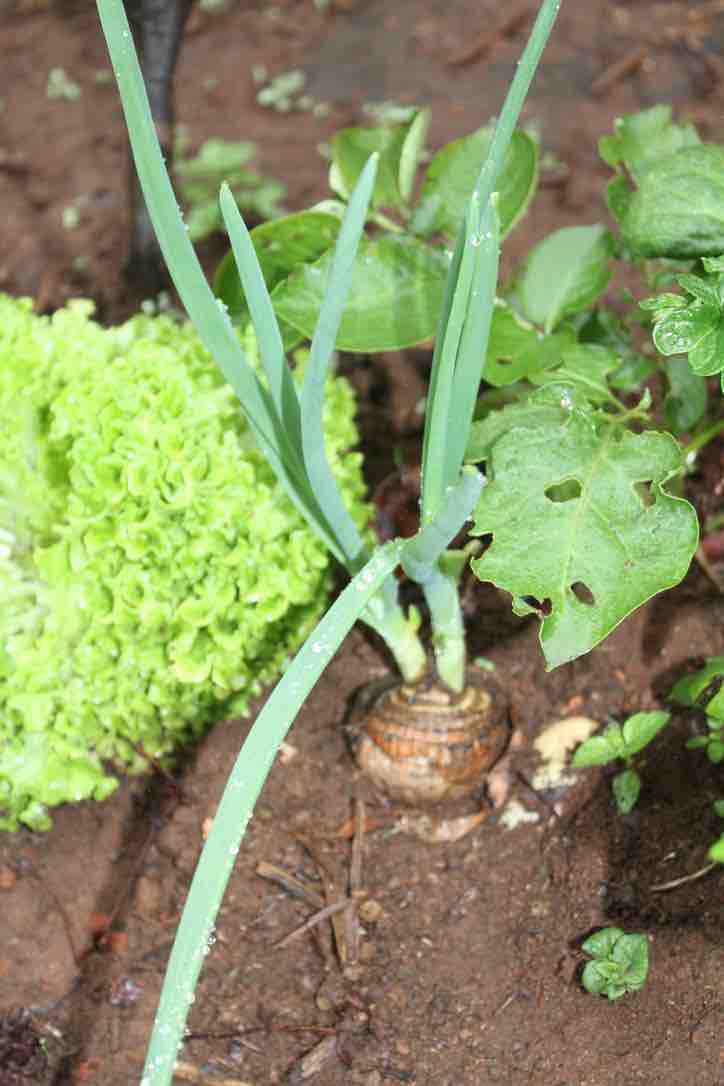
The easiest way to start is by simply planting onions that have begun to sprout straight into your garden. Dig a small hole, shovel in a little compost and drop the bulb that you otherwise would have tossed directly in the ground.
Cover it lightly with a little soil and before long the green-shoots will make their appearance.
Use of a little dilute leachate from a worm-farm promotes the new growth.
They also grow easily from small cuttings, indoors in a pot or out in your garden; they need plenty of sunshine. Take an onion that you have bought and slice off the bottom third including the root-end. Eat the top portion as per normal.
You could drop the cutting into a small-tub of water but provided you irrigate it regularly, you can pop it straight into the garden.
I prefer to site them near other plants like lettuces that you would
water most days in dry weather. Then the young onion-cuttings will
be kept moist. Within a few weeks you will have wonderful greens to go
on your salads. As you snip off the shoots you will find that the bulb
starts to thicken.
Onions belong to the allium-family of vegetables.
They are loaded with important phytochemicals like allicin and many other antioxidants that mop up free-radicals; those are the nasties that should be called terminators. They finish us off.
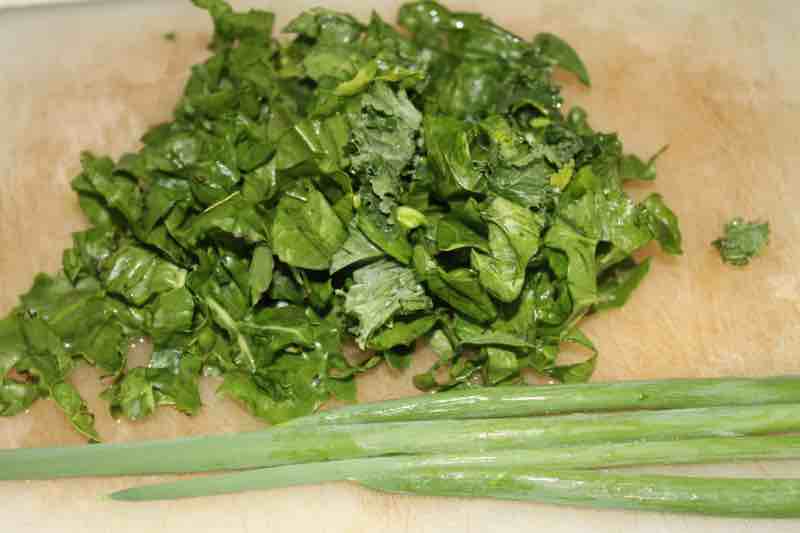
We particularly love to add these onion-shoots most mornings to our breakfast; eggs Hilton is a firm favourite. Greens like these at least twice a day keep me regular; like no other medicine.
Constipation is another terminator; I am sure you too have no desire to suffer from a colo-rectal tumour, with a little stoma and pouch to collect your faeces.
It kills roughly one in twenty five people enjoying typical grocery store food, the second-most common cause of death from malignant neoplasms; and the prevalence is increasing in younger persons. It comes as no surprise that more fibre is advised[1]. On average we eat less than half the recommended amount.
And in any case dishes like these are what I call slow-food, made fast. The taste is out of this world.
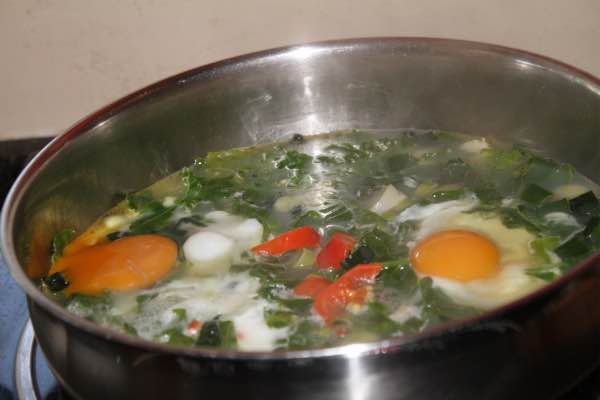
Whatever is in season goes into our breakfast; peppadews, spinach and of course the sweet young-shoots from our experiments with how onions grow. Often there will be bits of broccoli, garlic and green beans; or perhaps a few peas.
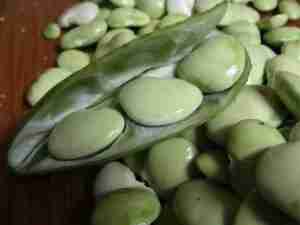 Shelled lima beans
Shelled lima beansEnjoy a breakfast like this on a slice of wholemeal toast and you will not be famished at 11 o'clock; snacking on cookies and colas. They are our downfall, particularly in these times; have you noticed in the obit photographs how many folks that have died had double-chins?
We particularly love pan-fried toast with our Eggs Hilton. That is another way to introduce a whole-gamut of different flavours.
Spinach incidentally is one of the richest sources of alpha lipoic acid, a natural phytonutrient that helps prevent non-alcoholic fatty liver disease; there is a very high incidence in modern society. Oddly it is caused not by too many oils in our food but by refined carbohydrate.
The liver sucks up the glucose absorbed in the small intestine, turning it into triglycerides but it is a slow process; if we consume too many foods that form sugars then that fat cannot escape fast enough into the blood. The result is a nasty condition called steatohepatitis.
Physiologists explain that the deadly triglycerides in the blood are those formed from the carbohydrates that we love; and not from the oily foods we consume. And especially the refined-starches which is why we have turned to baking our own bread using 100% real flour.
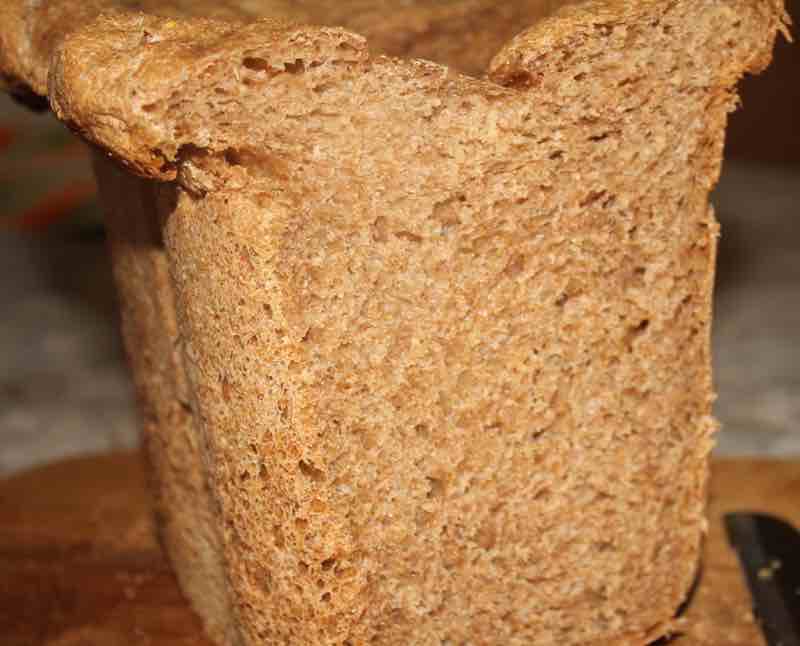
Once you taste artisan bread like this you will never go back to the commercial loaf. Just one slice contains 4g of fibre; recommendations are that we should consume at least thirty-grams per day.
To get that though you will have to mill your own flour; commercial-wholemeal seen below in the centre portion has almost half the fibre removed.
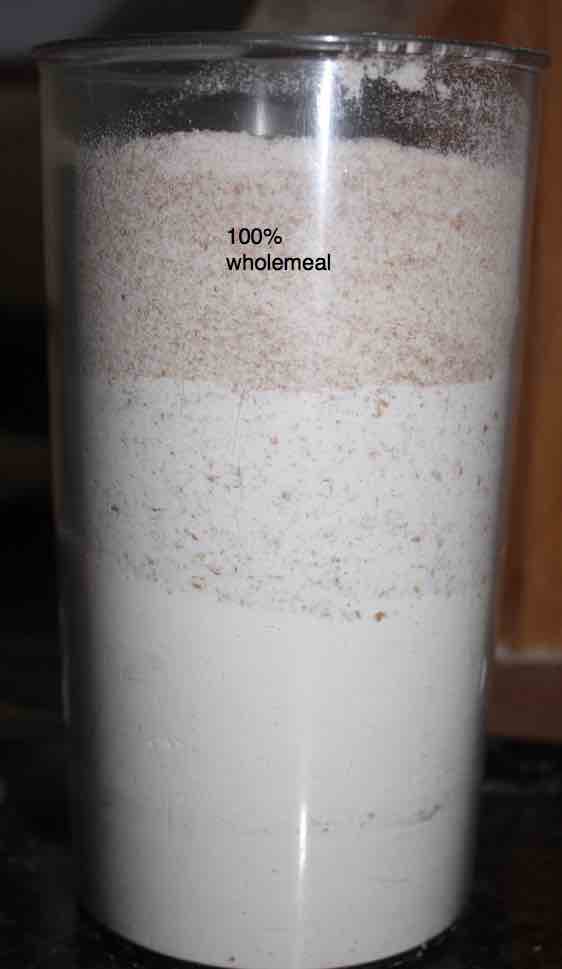
Researchers have shown that the beta-cells in the pancreas can be restored within three months if blood glucose is strictly controlled; zero refined carbs and reduced starches.
How onions grow
How onions grow from small cuttings is the theme for this week. Whether it's for the flavour they add or the wonderful way in which they promote well-being and help prevent disease; or the sheer fascination with how plants grow, they are winners. Never a day passes when we do not enjoy these green fronds.
Help save the planet too by planting your sprouting onions; do not send them to the dump or even the compost heap. Do you know that we humans discard nearly a third of the food grown by farmers?
And of course eventually the bulbs grow large enough for you to enjoy the whole onion.
Worm farming
Small-scale backyard worm farming not only helps dispose of your kitchen waste but provides wonderful organic fertiliser for the garden. What is needed is any container with a hole at the bottom and a lid. Old discarded bathtubs are often used.
On a large-scale getting enough food for the worms is a messy business; they eat their own weight every day. Then you will see how onions grow.
When browsing use right click and "Open Link in New Tab" or you may get a bad gateway signal.
Newsletter
Our newsletter is entitled "create a cyan zone" at your home, preserving both yourself and Mother Earth for future generations; and the family too, of course. We promise not to spam you with daily emails promoting various products. You may get an occasional nudge to buy one of my books.
Here are the back issues.
- Lifestyle and ideal body weight
- What are ultra-processed foods?
- Investing in long-term health
- Diseases from plastic exposure
- Intensive lifestyle management for obesity has limited value
- A world largely devoid of Parkinson's Disease
- The impact of friendly bacteria in the tum on the prevention of cancer
- There's a hole in the bucket
- Everyone is talking about weight loss drugs
- Pull the sweet tooth
- If you suffer from heartburn plant a susu
- Refined maize meal and stunting
- Should agriculture and industry get priority for water and electricity?
- Nature is calling
- Mill your own flour
- Bake your own sourdough bread
- Microplastics from our water
- Alternative types of water storage
- Wear your clothes out
- Comfort foods
- Create a bee-friendly environment
- Go to bed slightly hungry
- Keep bees
- Blue zone folk are religious
- Reduce plastic waste
- Family is important
- What can go in compost?
- Grow broad beans for longevity
- Harvest and store sunshine
- Blue zone exercise
- Harvest and store your rainwater
- Create a cyan zone at your home
Did you find this page interesting? How about forwarding it to a friendly book or food junkie? Better still, a social media tick would help.
- Bernard Preston homepage
- Greens
- How Onions Grow
Address:
56 Groenekloof Rd,
Hilton, KZN
South Africa
Website:
https://www.bernard-preston.com